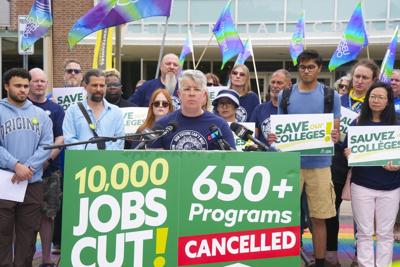Talks are expected to continue late into the night to try to avert a strike by 10,000 full-time college staff that could see them hit the picket lines Thursday morning.
The Ontario Public Service Employees’ Union said its main goal is to ensure job security for its workers during tumultuous times for the province’s 24 public colleges.
But the College Employer Council ÔÇö the schools’ official bargaining agent┬áÔÇö called such staffing guarantees “poison pills” that schools can’t agree to as they grapple with lower enrolment and ongoing financial challenges that have already led to program and job cuts as well as campus closures.
“The landscape has changed dramatically since we started bargaining,” said Christine Kelsey, who chairs OPSEU’S college support staff bargaining team.
”... We are trying to stabilize the system ÔÇö not just for this term, but for generations to come,” added Kelsey.
The full-time college support staffers hold a variety of jobs, including disability services, library technologists, trades, co-op placement co-ordinators, food services and IT.
(College faculty, who earlier this year landed a three-year agreement, are not affected, and classes are expected to continue should there be a strike.)
The College Employer Council has said the union is asking for a “complete ban on college or campus mergers or closures during the life of the agreement, and ... a total prohibition on any staff reductions, regardless of circumstance.”
These “poison pills were added by the unionÔÇÖs negotiating team 11 days into bargaining, and only after union members voted to strike,” the council said last week in a written release.
“There remain many issues to address at the bargaining table. However, these are demands no college operating in Ontario could ever accept,ÔÇŁ council CEO Graham Lloyd said at the time, adding “OPSEU is ignoring the reality that college enrolment and revenues are down as much as 50 per cent. No organization managing a drop like this can commit to these out-of-touch demands.”
Colleges have been hit hard by federal cuts to international students, who pay several times more in tuition, which they had come to rely on to boost revenues. They are also struggling with an ongoing tuition freeze and provincial funding they say has not kept up with their actual costs. 
About 10,000 jobs have been lost in the college sector over the past year, out of a total of about 60,000 staff and faculty. 
Kelsey said the union will continue bargaining “up to a midnight strike deadline in a round that is, at its core, about job security,” given the “full extent of layoffs ... (which are) causing chaos for students and communities.”
In a written statement, she said the college council has not put forward anything “which actually protects jobs. If that doesnÔÇÖt change by midnight, 10,000 full-time support staff are ready to strike for the future of student support.”
The union wants “to see quality education kept in our backyard,” added┬áKelsey, who has worked with students with disabilities as an assistive technologist at Ottawa’s Algonquin College. “ItÔÇÖs why weÔÇÖre fighting to keep student supports in-house, good jobs in our communities, and colleges adequately staffed, resourced┬áÔÇö and open.”┬á
The college council has said it has offered the union more than $140 million in improved salaries and benefits.
OPSEU, in an online update to members around dinnertime Wednesday, told members that in the event of a strike, it would stand up for “not just full-time support staff, but also part-time support staff, and faculty, who choose not to cross our picket lines,” suggesting it expects members in other bargaining units to support the job action.
“For the first bargaining round in history, we are fighting in a college system that is wall-to-wall union,” the OPSEU post says. “We have the ability to stand together in a way we never have before┬áÔÇö and with what is happening in our colleges, we need to more than ever.”





























To join the conversation set a first and last name in your user profile.
Sign in or register for free to join the Conversation